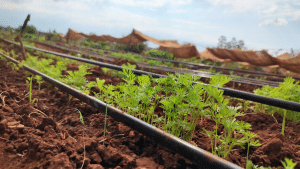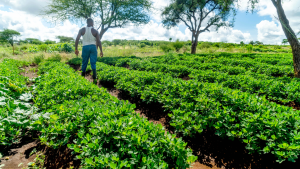The global economic landscape is woven with both opportunity and disparity. Despite advancements, the harsh reality is that millions grapple with unemployment, and the gender pay gap remains a persistent stain. In the face of persistent unemployment, particularly amongst youth and women, and the ever-present struggle for equal pay for equal work, organisations like Ambokili Farm are weaving a new narrative around Sustainable Development Goal (SDG) 8: Promote sustained, inclusive and sustainable economic growth, full and productive employment and decent work for all.
By fostering decent work, promoting inclusivity, and embracing innovation, the farm is not only contributing to Sustainable Development Goal 8 but also cultivating a future where economic prosperity is synonymous with environmental stewardship, sustainability and community development.
Fostering Decent Work and Economic Growth:
The global unemployment landscape paints a concerning picture. The International Labour Organization (ILO) reports that in 2022, nearly one in four young people were Not in Education, Employment, or Training (NEET), and the global unemployment rate, while showing signs of recovery from the pandemic’s shock, had been already projected to rise slightly in 2023.
Individuals living in Kimana, Kajiado, Kenya are mostly low-income earners. Due to inadequate employment opportunities in the area, employers tend to take advantage of their employees. Most individuals work under harsh environmental conditions, work long hours and get paid little wages, sometimes, less than what is required by country and county laws.
At the heart of Sustainable Development Goal 8 lies the imperative of fostering decent work and economic growth for all. Ambokili Farm, through its organic farming practices and community engagement initiatives, is not only cultivating crops but also cultivating opportunities for meaningful employment.
By creating 28 jobs with fair wages and adhering to county wage laws, the farm is fostering economic growth and change at the grassroots level. We pay more than most firms established in the area and do not allow our employees to work at certain times of the day when the sun is too hot or it’s rainy.
We’re creating more jobs per unit of land and offering decent work opportunities.
Inclusive Employment:
Ambokili Farm provides opportunities for a diverse range of people, including formal and informal workers, women, youth, and People with Disabilities. This promotes inclusive economic growth. Our diverse, highly talented and globally experienced team continues to enable us to achieve our goals.
Empowering Through Entrepreneurship:
Entrepreneurship and innovation are the cornerstones of sustainable economic growth. Ambokili Farm’s adoption of organic permaculture and environmental conservation practices exemplifies innovation in agriculture. B Through seed distribution and educational workshops, the farm equips individuals with the tools and knowledge they need to cultivate their own land, fostering entrepreneurship and economic independence. This ripple effect extends beyond the farm gates, fostering economic stability and resilience within the community. This initiative aligns with Target 8.3 of SDG 8, which emphasizes supporting productive activities and entrepreneurship.
Sustainable Consumption and Production:
Sustainable consumption and production are essential for decoupling economic growth from environmental degradation. Ambokili Farm’s organic farming practices not only contribute to environmental sustainability but also promote resource efficiency in consumption and production. By reducing chemical usage, improving soil health, and fostering biodiversity, the farm is demonstrating the viability of sustainable agriculture as a driver of economic growth and aligning with Target 8.4 of SDG 8.
Resilience and Stability:
Our organic farming practices, such as crop diversification and soil conservation, enhance the resilience of agricultural systems to climate change and market fluctuations. This creates sustainability and promotes more stable and sustainable livelihoods; thus, contributing to long-term economic growth.
Local and Regional Development:
By supporting local food systems and rural development, Ambokili Farm is contributing to the creation of vibrant and sustainable economies.
By prioritising fair labour practices, community empowerment, and environmental sustainability, the farm is not only contributing to a more equitable and prosperous future for Kajiado County but also serving as a model for sustainable development worldwide. As we focus on empowering individuals, protecting the environment, and building a thriving community, Ambokili Farm contributes to SDG 8 and etches its name in the records of history of positive social change.
Let’s embrace the promise of a more sustainable and inclusive future for all.







